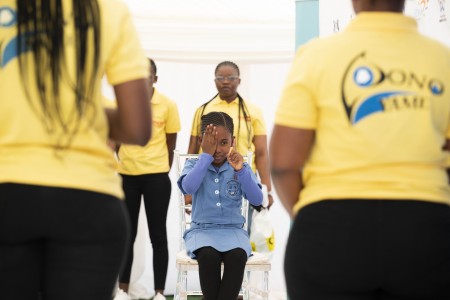02 Nov, 2022

School children being screened in Molefe school demonstrating how Peek technology works.
Credit: Peek Vision
On the 10th of October 2022, Her Royal Highness, The Countess of Wessex and Forfar, visited Molofe school to attend the launch of Pono Yame. Pono Yame (“My Vision”) is the Government of Botswana’s national school eye health programme. It is one of Africa’s first government-led national school eye health programmes that aims to screen and provide appropriate treatment to every school-going child in the country. To date, over 30,000 children have been screened. The programme is powered by Peek technology, providing smartphone screening tools and data insights to help the programme make the most of its resources and identify where children are being left behind. Botswana is the first country to adopt cutting-edge technology from Peek Vision at the national level ensuring all children are screened and treated as efficiently as possible.
Event highlights included addresses from The Countess of Wessex, Minister of Education and Life Skills Hon. Dr Douglas Letsholathebe, Permanent Secretary from the Ministry of Health and Wellness, Ms Grace Muzila and Peek Vision CEO Andrew Bastawrous.
In her speech, The Countess noted that the Queen Elizabeth Diamond Jubilee Trust (where she served as the Vice Patron) partly funded the earliest tests of Peek Vision in Botswana. She reflected that for over two decades, she had been working as a global ambassador for the International Agency for the Prevention of Blindness (IAPB), and too often, the issue of vision loss does not get the attention it deserves.
She continued noting that the gift of sight is valuable yet often overlooked. If a child’s vision goes undetected, that child may not get the same life chances as others and may not thrive. She added that “the launch presents an excellent opportunity to thank H.E. President Masisi and the Government of Botswana, which has chosen to place the importance of eye care of its children as part of its health programming.”
In closing, The Countess underscored the importance of sustainability, observing that in 2021 the United Nations committed to tackling issues of vision loss and this year, at The Commonwealth Heads of Government Meeting (CHOGM) in Rwanda, there was further commitment. However, she stressed, “impetus can wane and great gains at the start risk being lost if this kind of program is not embedded in the national health care system as something that needs to be continued. I encourage you all to keep this momentum going so that the children from today’s Botswana and the children who belong to tomorrow’s Botswana can see clearly into the future.”
Peek Vision CEO, Andrew Bastawrous, began his remarks by congratulating the Government of Botswana, noting that the country is breaking new ground with Pono Yame by screening and treating every single school-going child in the country. “The trajectory is changing, and the country is sending a loud message beyond Botswana. This small and mighty country is doing something very special by providing eye care services to every school-going child.”
His Excellency President Dr Mokgweetsi Masisi, a former teacher, has consistently advocated for child eye health since taking office in 2018. In a discussion with The Countess, Dr Masisi said that “It is my earnest belief that Pono Yame – ‘My Vision’ – will definitely give Botswana’s children a chance to see clearly, and maximise their wellbeing, education and productivity.” The Countess responded positively, adding, “I saw the huge involvement in utilising the latest technology to screen and detect eyesight problems and offer solutions, including tracking the treatment offered and its impact. I heard a young lady speak movingly about how the programme has been of benefit, and after the initial investment, we believe over time it will be heavily impactful.”
President Masisi is a global champion for child eye health for the International Agency for the Prevention of Blindness (IAPB). Botswana is poised to show the world that a national, government-led school eye health programme can be made a sustainable, permanent part of the health system.